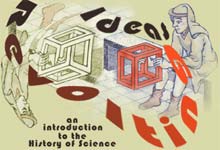
University of California, Irvine
Instructor: Dr. Barbara J. Becker

|
Week 5. Putting Nature on the Rack Private Science vs. Public Science
|
Supplementary readings for Week 5's lectures include excerpts
from:
|
During the seventeenth century, there was a proliferation of scientific societies--communities of individuals, often working outside the traditional university context, who were attracted by the new experimental approach to natural philosophy. They didn't want to hear or read about nature, they wanted to see it in action for themselves. They agreed with essayist, Sir Francis Bacon, that simple observation of Nature was insufficient to gain true understanding of how it works. Before Nature would give up its secrets, its "inquisitors" would have to put it on the rack and force it to "talk" by pulling it, jabbing it, taking it apart and all the other sorts of things we have come to associate with the experimental method.
In The New Atlantis, Bacon describes the adventures of a storm-tossed crew of sailors. After setting out from Peru, their ship becomes lost in the South Pacific. Luck brings them in sight of a mysterious and uncharted island known as Bensalem to its residents. The hapless seamen soon find Bensalem to be an island of knowledge in a sea of ignorance--a place where learned scholars routinely search for new ways to derive social benefit from natural phenomena at the state-sponsored research facility called Saloman's House.
Bacon intended his scholarly utopia to serve as a blueprint for learned men to establish a society devoted to the acquisition and diffusion of new knowledge. Bacon's disciples put his ideas into action: they used the principles that guided the research conducted by Bensalem's scholars at Saloman's House as the model for the Royal Society of London.
One hundred years after The New Atlantis was published, satirist Jonathan Swift took aim at the activities of the Royal Society in his novel, Gulliver's Travels. In Part III, world traveler, Lemuel Gulliver visits the island of Balnibarbi vaguely located in the Pacific somewhere sort of near Japan. While there, Gulliver is given a tour of the erudite Academy of Lagado where he meets several "projectors"--individuals at work on a wide range of experimental projects that they view as extremely practical as well as enlightening.
How does Swift's view of the Academy's projectors compare with Bacon's portrayal of the workers at Saloman's House? How do both Bacon's and Swift's views of researchers compare with common perceptions of practicing scientists today?
|